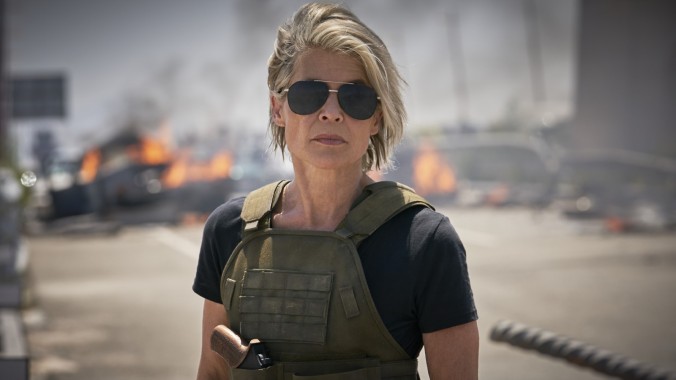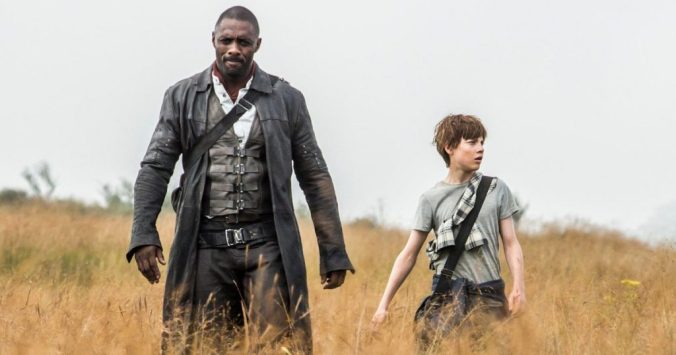
Linda Hamilton is back as Sarah Connor in Terminator: Dark Fate, and the film’s all the better for it.
When Terminator Genisys came out in 2015, I left the theater thinking, “That was fun, but I don’t need another Terminator movie.” After all, with the creation of alternate timelines, the over-complication of time travel, and drifting further and further from the “do it small and do it well” mentality that James Cameron so wonderfully infused into The Terminator way back in 1984, what could another entry in the long-running franchise possibly have to say?
It turns out a bit more than I thought.
Picking up 22 years after the events of Terminator 2: Judgement Day (director Tim Miller smartly—and boldly—ignores its latter installments), young factory worker Dani Ramos (Natalia Reyes, a convincing “everywoman” and our entry into the story) has her world upended when the mysterious Grace (Mackenzie Davis) arrives. A human enhanced with Terminator-like abilities, she’s been sent from 2042 to protect her, adamant that Dani is integral to saving the world from a future that has yet to happen.
But when they cross paths with Sarah Connor, behind her dark sunglasses and determined scowl is an air of confusion. She prevented Judgement Day, way back in 1995. But as she and Dani quickly learn, the Judgement Day that Sarah and John prevented from happening wasn’t completely stopped, they just kicked the can down the road a few decades as mankind has—as it seems inevitable to do—found a new way to accidentally create the rise of an AI that seeks to wipe out mankind.
If this sounds a bit familiar to past installments, you would be right. But having Linda Hamilton back in the role of Sarah Connor, unapologetically kicking ass and taking names, is 100% the number one reason what makes this movie work. Dani is a good protagonist (the “new Sarah”, if you will), but Sarah (and Hamilton’s performance) is the anchor here—and what a huge, welcome anchor it is. The film wouldn’t be even close to as good as it was without her involvement. Even after 20+ years, Sarah (and Hamilton) is still fierce, capable, and commanding. Hamilton’s performance is seamless and you’d never know this is her first time returning to the series since T2, her performance informed by the new layers the script peels away at her character—grief, anger, obsessiveness, and a single-minded determination. Whether in a mere smirk, a look in her eyes, or body movement, Hamilton is able to convey—and convince us of—all Sarah is going through. And with two decades of emotional baggage, it’s a lot.
Tim Miller & co. made a smart move by choosing to focus on character more than past installments and it really works. The acting across the board is great, with passionate, convincing performances from all involved. From Mackenzie Davis’s fierceness, to the innocence and building intensity that Natalia Reyes infuses into Dani, not to mention the humorous, hulking, committed, and surprisingly emotional performance of Schwarzenegger, each is a welcome presence and from the minute their paths converge and they team up, their quartet really makes the movie work.
The action and set pieces are thrilling and (mostly) relentless, and the film strikes just enough of a nice balance between treading new ground and bringing up elements from past installments to be engaging. There’s also genuinely funny humor peppered throughout the script, whether in Sarah’s zingy one-liners, T-800’s dry delivery, or a character voicing what the audience is thinking. It offers moments of relief throughout the film’s frenetically-paced action sequences, as well as grounding the characters, reminding us that they’re real people with a variety of emotional states. The film has just enough moments of character-driven flashbacks and times of quiet reflection, and allowing these scenes to breath in between the big set pieces really allows the characters to grow and breathe and give the audience the chance to connect with them and be infested in their journeys.
The film drags just a bit in the middle portion (but not for long), some of the action and fight scenes a little too quick and blurry for the viewer to really be able to follow each beat, and I’m still not sure how I feel about the film’s treatment of John Connor, but overall I don’t really have much to mark it down for. I can only say what I would’ve wanted even more of what it did right—more Sarah, more flashbacks and character work, more meditation on the film’s themes. It smartly avoids what Genisys did wrong: over-complicating things. While much grander and spectacle than The Terminator, Dark Fate’s story is simple and familiar, yet propulsive and energetic, spending its time focusing on crafting engaging action and building compelling characters rather than attempting to dream up new ways for the plot to overcomplicate itself with time travel, alternate timelines, and the like, hoping that something will stick.
I really enjoyed Dark Fate and found it to be much better than I was expecting it to be. The film deals with some interesting themes (fate, forgiveness, grief, and whether or not people—and machines—can truly change), and I’d like them to take it even further in the planned sequels of the “new trilogy” Cameron is reportedly spearheading. While fans’ concerns and fatigue over Terminator re-boots, sequels, and alternate timelines is understandable, it’d be a shame if more people don’t see this because Dark Fate is better than it has a right to be, especially after all these years (and all these attempts). My main concern is the direction for future films, as they can’t keep revolving each one about the postponement of the (seemingly) inevitable Judgment Day, but damn if they don’t do it well here.
8.5/10






